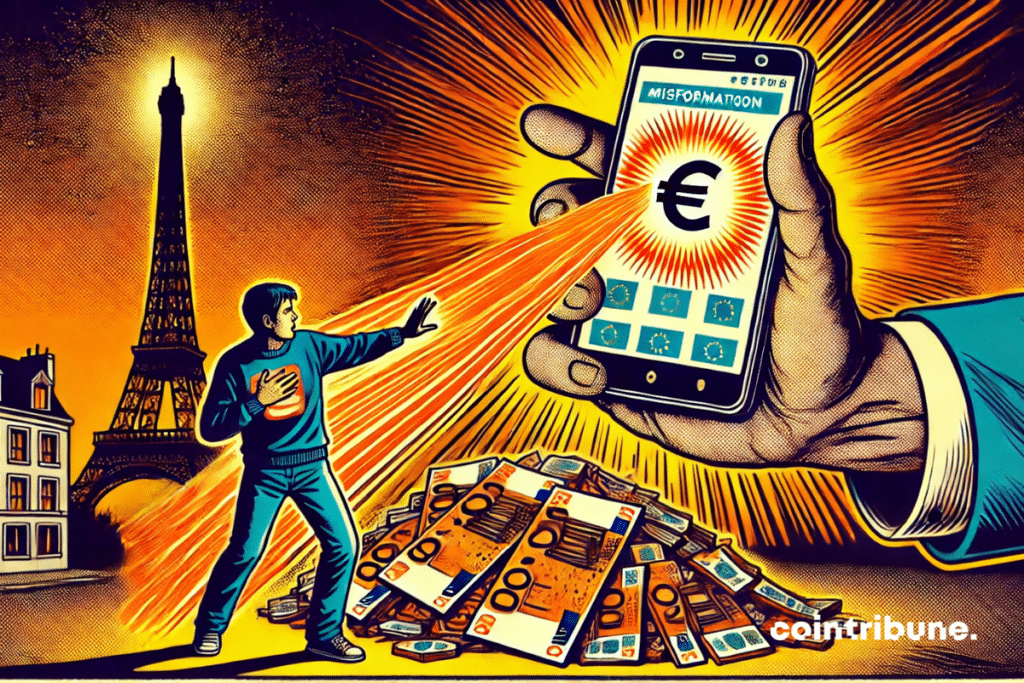TikTok Rumor Sparks Confusion Over Cash Ban In Europe
A viral video on TikTok claims that a law banning cash has been adopted in France. In a few days, this clip has rekindled fears about the end of cash and a fully digitized society. However, this claim is false, as no legal text confirms such a ban. Behind this misleading narrative, a very real topic deserves attention : the digital euro project led by the ECB, which aims to complement cash, not to eliminate it.

In Brief
- A TikTok video falsely claims that a law would ban the use of cash in France starting April.
- This rumor, denied by the absence of an official text, is based on viral content generated by artificial intelligence.
- The ECB’s digital euro project is real but aims to complement cash, not to abolish it.
- Cash remains used by a majority of French people and protected by institutions, as reminded by the Senate in 2024.
An unfounded rumor widely shared on social media
The video at the origin of the controversy has surpassed 240,000 views on TikTok, with a striking introduction :
It’s confirmed : new law in April, cash will soon be banned everywhere in France and Europe.
This content, which mentions an alleged replacement of banknotes by the digital euro, is nonetheless groundless. There is no trace of it in the list of promulgated texts this month. Moreover, the claim that “the digital euro will allow you to pay for all your purchases without ever using a single banknote” is based on a deliberate confusion with already existing tools, such as bank cards.
Research conducted on TikTok reveals that this type of misinformation fits into a recurring trend, recycling alarmist narratives since 2023. This recent wave of misleading content has several characteristics :
- A dubious origin : disseminated by channels claiming to be informational, but fueled by content generated via artificial intelligence ;
- Rapid proliferation : the topic “cash ban” refers to dozens of viral videos in French;
- Recurrence of the discourse : alarmist messages are recurring since last year, despite the lack of legal basis ;
- Manipulation of real facts : the digital euro project is used to give credibility to a narrative of economic freedom deprivation.
Despite the digital hype, no official statement or bill confirms this thesis in France. The use of cash remains legal and protected by French authorities, as reminded by debates in the Senate. Thus, resorting to fear and confusion here seems motivated more by the pursuit of clicks than by the dissemination of reliable information.
The digital euro, a complementary tool, not a replacement
Contrary to the misleading claims spread online, the digital euro is not intended to replace cash. The project, led by the ECB since 2021, envisions a digital currency meant to coexist with current payment methods.
According to official documents, the goal is to offer a form of payment complementary to banknotes and coins. The ECB’s intention is clear :
Ensure that citizens can continue to access central bank money even in the digital age, in order to preserve consumer choice freedom.
From a technical perspective, the digital euro is expected to be free for individuals, usable both online and offline, and to offer a high level of privacy, potentially equivalent to that of cash payments.
Cash remains widely used today. According to an ECB report, it is considered “important” or “very important” by 60 % of French people. The fear of a forced shift to digital is not supported by facts. However, in autumn 2024, a French bill aiming to further restrict cash payments was even rejected by the Senate, on the grounds that it would have “restricted payment freedom […] and weakened unbanked individuals”.
In the medium term, the adoption of the digital euro in France could transform certain aspects of banking practices, notably by reducing dependence on private intermediaries. However, the ECB assures that it intends to implement safeguards, particularly against excessive surveillance of transactions. Although deployment is planned between 2026 and 2027, its success will depend on social acceptance, citizen trust, and respect for individual freedoms. In this context, vigilance remains necessary, but it should not be driven by misinformation.
Maximize your Cointribune experience with our "Read to Earn" program! For every article you read, earn points and access exclusive rewards. Sign up now and start earning benefits.
Diplômé de Sciences Po Toulouse et titulaire d'une certification consultant blockchain délivrée par Alyra, j'ai rejoint l'aventure Cointribune en 2019. Convaincu du potentiel de la blockchain pour transformer de nombreux secteurs de l'économie, j'ai pris l'engagement de sensibiliser et d'informer le grand public sur cet écosystème en constante évolution. Mon objectif est de permettre à chacun de mieux comprendre la blockchain et de saisir les opportunités qu'elle offre. Je m'efforce chaque jour de fournir une analyse objective de l'actualité, de décrypter les tendances du marché, de relayer les dernières innovations technologiques et de mettre en perspective les enjeux économiques et sociétaux de cette révolution en marche.
The views, thoughts, and opinions expressed in this article belong solely to the author, and should not be taken as investment advice. Do your own research before taking any investment decisions.